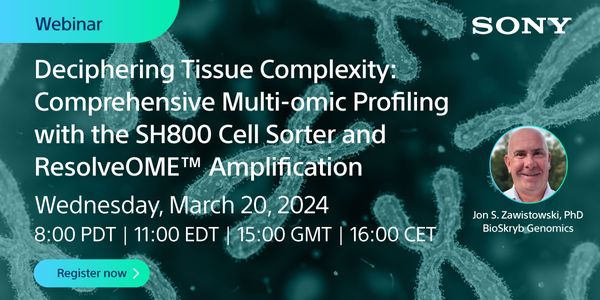Transcriptomics
Transcriptomics: is the study of the transcriptome-the complete set of RNA transcripts that are produced by the genome, under specific circumstances or in a specific cell-using high-throughput methods, such as microarray analysis.
-
NOV 18, 2025 | 8:00 AMTranscriptomics represents a critical discipline in cancer research, enabling comprehensive mapping of gene expression profiles and the identification of fusion genes implicated in tumor dev...NOV 12, 2025 | 7:00 AMIn recognition of Pancreatic Cancer Awareness Month, join us to explore how cutting-edge technologies are transforming our understanding of pancreatic ductal adenocarcinoma (PDAC), one of th...Speaker: Dr. Max Reichert , Dr. Hartland Jackson , Dr. Andrea RadtkeSponsored By: Leica MicrosystemsOCT 30, 2025 | 9:00 AMAging is associated with progressive white matter degeneration, which impairs brain structure and function. Defects in myelinating glial cells, combined with chronic neuroinflammation, contr...OCT 28, 2025 | 7:00 AMC.E. CREDITSIn recognition of Breast Cancer Awareness Month, join us for a live webinar to uncover the complexity of tumor biology and the surprising resilience of normal tissue. This event will feature...Speaker: Alison Cheung, PhD , Colinda Scheele, PhD , Dr. Andrea RadtkeSponsored By: Leica MicrosystemsOctober 16, 8am PT / 11am ET / 4pm BSTThis presentation will describe both common and specialized multiplex methods for RNA in situ hybridization (ISH) and immunohistochemical labeling of proteins (IHC). We initially used neuron...Our experience collaborating with oncology and immunology leaders in the pharmaceutical and biotech space has revealed the numerous challenges in every stage of drug development. From target...Speaker: Sathiya Manivannan
JUN 10, 2025 | 6:00 AM
Personalized health profiling using multi-omics data has the potential to reveal immunometabolic disruptions among individuals living with HIV (PWH) who are effectively undergoing antiretrov...
MAY 28, 2025 | 8:00 AM
Join us for an insightful session where we explore how NGS proteomics is transforming our understanding of health and disease. Discover how proteomics integrates seamlessly with genomics, me...
APR 29, 2025 | 8:00 AM
Only one in four transplant waitlisted patients receive a life-saving organ. Xenotransplantation of pig organs into humans is a promising avenue for addressing organ shortage. Understanding...
MAR 26, 2025 | 8:00 AM
Single-cell analysis is a new and rapidly growing field that is shedding new insight into the cellular mechanisms behind the pathogenesis and treatment of infectious diseases and cancer. Cel...
FEB 05, 2025 | 8:00 AM
The advent of the spatial omics era has enabled researchers to acquire vast amounts of transcriptomics and proteomics data. The abundance of a transcript, however, does not necessarily displ...
Speaker:
Kendra Ritchie
, Joseph Melko, MS
, Sara Bodbin, PhD
JUL 24, 2024 | 11:00 PM
C.E. CREDITS
Spatial transcriptomics offers a revolutionary approach to understanding the tumor microenvironment (TME) in solid tumors by preserving the spatial context of gene expression, which is cruci...
JUN 27, 2024 | 6:00 AM
C.E. CREDITS
High-resolution spatial transcriptomics stands at the forefront of technological advancements, offering transformative capabilities in the domain of tumor biology research. In this presentat...
MAY 23, 2024 | 7:00 AM
Nucleic acid extraction is a fundamental step in unlocking the genetic information contained within biological samples. Isolated nucleic acids are the basis for a multitude of analyses and a...
Genomics, epigenomics and transcriptomics are often thought of as independent fields, but in our clinical practice we use them combined to increase diagnostic yield both for constitutional a...
Speaker:
Peter Lajos Nagy, MD, PhD
APR 10, 2024 | 9:00 AM
Leveraging advancements in spatially resolved single-cell profiling, our study enhances understanding of glioma evolution and the complex tumor microenvironment. Through spatially resolved m...
MAR 20, 2024 | 8:00 AM
Deciphering somatic mosaicism in healthy tissues and clonal diversity in tumors necessitates single-cell analysis. High-quality genomic and transcriptomic data at the single-cell level depen...
MAR 12, 2024 | 10:00 AM
In this webinar, we will briefly introduce Vizgen’s Vizgen® MERSCOPE® Platform for spatial transcriptomics. Following this introduction, we will showcase the capabilities of ME...
Globally there has been a constant rise in the population suffering from cardiovascular diseases mostly due to metabolic complications. We have made use of two high throughput omics-based ap...
Speaker:
Prasanth Puthanveetil, PhD
Presented at: Drug Discovery & Development Virtual Event Series 2024
NOV 07, 2023 | 10:00 AM
In the last 5 years, the US Food and Drug Administration has approved 4 anti-CD19 chimeric antigen receptor T cell (CART19) products for relapsed/refractory B cell lymphomas and leukemia. Ho...
JUL 20, 2023 | 8:00 AM
Single-cell ATAC-seq (Assay for Transposase-Accessible Chromatin using sequencing, scATAC-seq) is a relatively new and powerful technique that allows researchers to identify open chromatin r...
MAY 31, 2023 | 11:00 AM
Date: May 31, 2023 Time: 11:00am (PDT), 2:00pm (EDT), 8:00pm (CET) Single-cell genomics has facilitated the understanding of mechanisms involved in various biological processes such as tumor...
MAY 24, 2023 | 8:00 AM
Recent advances in multi-omic approaches, including genomics, transcriptomics, and proteomics, enable a more comprehensive description of the tumor. This promises to accelerate the developme...
Date: April 26, 2023 Time: 8:00am (PDT), 11:00am (EDT), 5:00pm (CEST) The heart is a 380-million-year-old organ, yet we do not have a complete understanding of the molecular landscape in the...
NOV 18, 2025 | 8:00 AM
Transcriptomics represents a critical discipline in cancer research, enabling comprehensive mapping of gene expression profiles and the identification of fusion genes implicated in tumor dev...
NOV 12, 2025 | 7:00 AM
In recognition of Pancreatic Cancer Awareness Month, join us to explore how cutting-edge technologies are transforming our understanding of pancreatic ductal adenocarcinoma (PDAC), one of th...
Speaker:
Dr. Max Reichert
, Dr. Hartland Jackson
, Dr. Andrea Radtke
Sponsored By: Leica Microsystems
OCT 30, 2025 | 9:00 AM
Aging is associated with progressive white matter degeneration, which impairs brain structure and function. Defects in myelinating glial cells, combined with chronic neuroinflammation, contr...
OCT 28, 2025 | 7:00 AM
C.E. CREDITS
In recognition of Breast Cancer Awareness Month, join us for a live webinar to uncover the complexity of tumor biology and the surprising resilience of normal tissue. This event will feature...
Speaker:
Alison Cheung, PhD
, Colinda Scheele, PhD
, Dr. Andrea Radtke
Sponsored By: Leica Microsystems
October 16, 8am PT / 11am ET / 4pm BST
This presentation will describe both common and specialized multiplex methods for RNA in situ hybridization (ISH) and immunohistochemical labeling of proteins (IHC). We initially used neuron...
Our experience collaborating with oncology and immunology leaders in the pharmaceutical and biotech space has revealed the numerous challenges in every stage of drug development. From target...
Speaker:
Sathiya Manivannan
JUN 10, 2025 | 6:00 AM
Personalized health profiling using multi-omics data has the potential to reveal immunometabolic disruptions among individuals living with HIV (PWH) who are effectively undergoing antiretrov...
MAY 28, 2025 | 8:00 AM
Join us for an insightful session where we explore how NGS proteomics is transforming our understanding of health and disease. Discover how proteomics integrates seamlessly with genomics, me...
APR 29, 2025 | 8:00 AM
Only one in four transplant waitlisted patients receive a life-saving organ. Xenotransplantation of pig organs into humans is a promising avenue for addressing organ shortage. Understanding...
MAR 26, 2025 | 8:00 AM
Single-cell analysis is a new and rapidly growing field that is shedding new insight into the cellular mechanisms behind the pathogenesis and treatment of infectious diseases and cancer. Cel...
FEB 05, 2025 | 8:00 AM
The advent of the spatial omics era has enabled researchers to acquire vast amounts of transcriptomics and proteomics data. The abundance of a transcript, however, does not necessarily displ...
Speaker:
Kendra Ritchie
, Joseph Melko, MS
, Sara Bodbin, PhD
JUL 24, 2024 | 11:00 PM
C.E. CREDITS
Spatial transcriptomics offers a revolutionary approach to understanding the tumor microenvironment (TME) in solid tumors by preserving the spatial context of gene expression, which is cruci...
JUN 27, 2024 | 6:00 AM
C.E. CREDITS
High-resolution spatial transcriptomics stands at the forefront of technological advancements, offering transformative capabilities in the domain of tumor biology research. In this presentat...
MAY 23, 2024 | 7:00 AM
Nucleic acid extraction is a fundamental step in unlocking the genetic information contained within biological samples. Isolated nucleic acids are the basis for a multitude of analyses and a...
Genomics, epigenomics and transcriptomics are often thought of as independent fields, but in our clinical practice we use them combined to increase diagnostic yield both for constitutional a...
Speaker:
Peter Lajos Nagy, MD, PhD
APR 10, 2024 | 9:00 AM
Leveraging advancements in spatially resolved single-cell profiling, our study enhances understanding of glioma evolution and the complex tumor microenvironment. Through spatially resolved m...
MAR 20, 2024 | 8:00 AM
Deciphering somatic mosaicism in healthy tissues and clonal diversity in tumors necessitates single-cell analysis. High-quality genomic and transcriptomic data at the single-cell level depen...
MAR 12, 2024 | 10:00 AM
In this webinar, we will briefly introduce Vizgen’s Vizgen® MERSCOPE® Platform for spatial transcriptomics. Following this introduction, we will showcase the capabilities of ME...
Globally there has been a constant rise in the population suffering from cardiovascular diseases mostly due to metabolic complications. We have made use of two high throughput omics-based ap...
Speaker:
Prasanth Puthanveetil, PhD
Presented at: Drug Discovery & Development Virtual Event Series 2024
NOV 07, 2023 | 10:00 AM
In the last 5 years, the US Food and Drug Administration has approved 4 anti-CD19 chimeric antigen receptor T cell (CART19) products for relapsed/refractory B cell lymphomas and leukemia. Ho...
JUL 20, 2023 | 8:00 AM
Single-cell ATAC-seq (Assay for Transposase-Accessible Chromatin using sequencing, scATAC-seq) is a relatively new and powerful technique that allows researchers to identify open chromatin r...
MAY 31, 2023 | 11:00 AM
Date: May 31, 2023 Time: 11:00am (PDT), 2:00pm (EDT), 8:00pm (CET) Single-cell genomics has facilitated the understanding of mechanisms involved in various biological processes such as tumor...
MAY 24, 2023 | 8:00 AM
Recent advances in multi-omic approaches, including genomics, transcriptomics, and proteomics, enable a more comprehensive description of the tumor. This promises to accelerate the developme...
Date: April 26, 2023 Time: 8:00am (PDT), 11:00am (EDT), 5:00pm (CEST) The heart is a 380-million-year-old organ, yet we do not have a complete understanding of the molecular landscape in the...
























